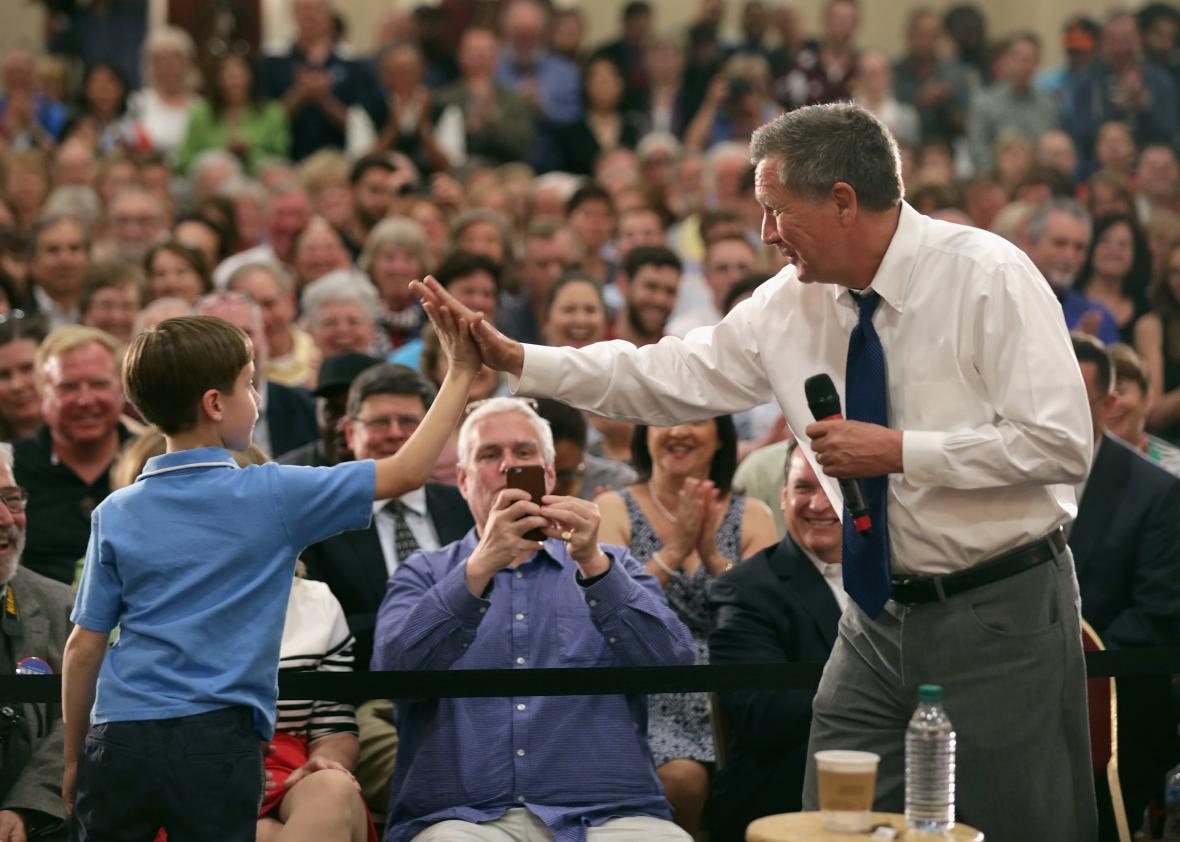Desperate times call for desperate measures. The campaigns of Ted Cruz and John Kasich announced Sunday evening that they have brokered a deal to divvy up three of the remaining states on the Republican calendar in the latest last-ditch effort to block Donald Trump from the nomination.
Under the unusual agreement, which was finalized on the sidelines of last week’s Republican National Committee spring meeting, Kasich will give up on Indiana’s May 3 primary to clear the way for Cruz to go head to head with Trump there, and Cruz will give up on Oregon’s May 17 primary and New Mexico’s June 7 primary to do the same for Kasich in those states.
The plan, however, does not extend to any of the other 13 remaining primaries, including the five in the Northeast and mid-Atlantic set for this Tuesday, or the delegate-rich contest in California on the final day of the GOP primary season in June. It’s also a passive alliance, rather than an active one. Both men have agreed not to campaign in the state(s) they’ve ceded to the other, but there’s nothing to suggest either will publicly encourage his own supporters to actually vote for the other when the time comes (as Marco Rubio did in Ohio during the final days of his campaign). That could come back to bite them if a significant slice of voters don’t get the message, particularly in Indiana where Trump could claim a majority of delegates with only a plurality of votes.
According to the New York Times, Kasich’s team had hoped to strike this type of divide-and-conquer deal last month, but the Cruz campaign balked at the idea given its candidate’s relative strength. Flash-forward to Monday, and Cruz has been mathematically eliminated from clinching the nomination during primary season and now knows it’s contested-convention-or-bust for his 2016 dreams. Kasich, meanwhile, will take pretty much whatever he can get at this point. He won a combined four delegates in the past five GOP contests and still trails Rubio in total delegates even though the Florida senator dropped out of the race more than a month ago.
Trump easily won New York last week and is expected to add to his total this week in contests in Connecticut, Delaware, Maryland, Pennsylvania, and Rhode Island. The celebrity billionaire’s strength in the delegate-heavy Northeast has put increased importance on Indiana, which offers the most bound delegates of any remaining contest other than California. Polling has been incredibly sparse in the Hoosier State, but those surveys we do have show Trump with a decent—but hardly dominant—lead on Cruz, with Kasich in a distant third-place. With Kasich removed from the equation, though, the race narrows considerably. A Fox News poll taken last week found Trump with an 8-point lead on Cruz in a three-way race but only a 2-point advantage in two-man contest with the Texan.
Given the way Indiana awards its 57 delegates—30 to the statewide winner, and then three to the winner of each of its nine congressional districts—Kasich was likely to do plenty of harm to Cruz by competing aggressively in the state without doing himself much good in the process. That made Kasich’s decision to devote his resources elsewhere a relatively easy one, particularly since he’ll now gain small advantages in Oregon and New Mexico, where the demographics and delegate allocation systems should make him more competitive. As an added bonus, the Ohio governor can now spin his upcoming loss in Indiana as either an act of self-sacrifice (to voters) or as savvy political gamesmanship (to donors), when in reality it will just save him the time and money he would have wasted in a state that was unlikely to award him more than a handful of delegates anyway.
The deal also looks like a net gain for Cruz. There are a combined 52 delegates up for grabs in Oregon and New Mexico, but—unlike Indiana—both states use a proportional system to dole them out, making the stakes considerably lower. By agreeing not to campaign in either, Cruz may cost himself a few delegates he might have otherwise won out West, but as long as those delegates go to Kasich and not Trump they won’t matter all that much. (Cruz is all but guaranteed to arrive in Cleveland with the second-most delegates to his name.) And any losses in Oregon or New Mexico would be more than offset if Cruz pulls out the victory in Indiana’s winner-take-most contest next week.
But just because the deal makes sense for both candidates doesn’t mean it will actually be enough to derail Trump, particularly since the abrupt alliance will give the real estate tycoon yet another chance to rail against the system he says is “rigged” against him. If Cruz ekes out a narrow victory in Indiana and knocks Trump further off his path to the nomination, the whole thing will, of course, look brilliant. But if Trump prevails in Indiana, there will rightfully be plenty of second-guessing about why Cruz and Kasich waited so long to strike the deal, and why they stopped short of a full-fledged partnership given the stakes. As it stands now, both men stand to gain more than they lose from their current deal. If they really want to stop Trump, though, eventually one or both may need to make a decision that actually works against his own self-interest.
